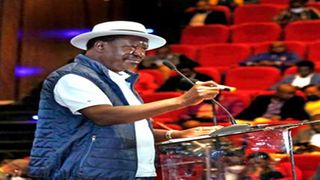
ODM leader Raila Odinga addresses a consultative forum for youths from the Mt Kenya region yesterday at the University of Nairobi Towers in Nairobi.
| Francis Nderitu | Nation Media GroupPolitics
Premium
Raila Odinga allies accuse IEBC of foul play
MPs allied to ODM leader Raila Odinga have accused the electoral body of using the ongoing mass voter registration to disenfranchise voters in their political strongholds.
With the 2022 presidential aspirants keen to drive up the number of registered voters in their backyards, the MPs claim that ODM’s political strongholds have been allocated fewer new polling stations, while some old ones have been degazetted.
At a meeting between the Committee on Justice and Legal Affairs and the Independent Electoral and Boundaries Commission (IEBC), MPs Tom Kajwang’ (Ruaraka), Peter Kaluma (Homa Bay Town) and Anthony Oluoch (Mathare) yesterday accused the commission of making 2022 voter registration projections “based on imaginations”.
The National Registration Bureau (NRB) data shows that 4.5 million national ID cards were issued between 2017 and 2021, and the MPs argue that this should be the basis of projecting the number of potential new voters, since it is the primary document required by the law.
The IEBC, however, has publicly announced that it is targeting to register six million new voters in the ongoing drive. The commission says this number was arrived at based on: the voter growth rate in the past two elections; the 2019 Kenya Population and Housing Census report; and the Kenya National Bureau of Statistics data on youths aged between 14 and 19 years.
14.4 million
The total number of registered voters in 2013 stood at 14.4 million. It rose to 19.6 million in 2017, indicating a growth of 36.1 per cent. Applying this rate to the 19.6 million puts the projected figure for 2022 at 26.7 million.
Mr Kaluma and Mr Kajwang’, however, said the figures are part of the wider scheme by the commission to skew the numbers. They want IEBC to explain the additional 1.5 million projected voters and their distribution based on actual numbers of individuals who acquired ID cards after 2017.
“The information is well grounded but we want the exact figures of those people who will be registered,” Mr Kajwang’ said, pointing out that it made no sense for the commission to include people without IDs in their projections.
“To be registered one must hold a national identity card. If they don’t have this critical ingredient, it will make no sense as they will not be registered,” said Mr Kajwang, adding that providing actual projections is important because it on the basis of this that resources are allocated to recruit new voters.
“It is also a political issue. Through it, we can tell how the issuance of ID cards is distributed across the country,” he said.
Mr Kaluma noted: “There is no point for the commission to calculate the figures when actual figures from the Department of Civil Registration are at its disposal.” He added that his constituency had lost out on one of its biggest polling stations and did not get another to replace it.
Polling stations
The projected numbers have been used as a basis for the gazetment of registration centres that are being used in the ongoing voter registration, and which will be converted to polling stations in the next General Election.
The chairman of the committee, Muturi Kigano, supported Mr Kaluma’s claim.
“I know that school,” he told Mr Chebukati, “it has ceased to exist. This is a very serious matter the commission must explain.”
IEBC’s acting CEO Marjan Hassan Marjan admitted that the Commission has received many complaints since the registration centres were gazetted.
“We’re reviewing the complaints and in the next few days we shall make the necessary changes,” he said.




